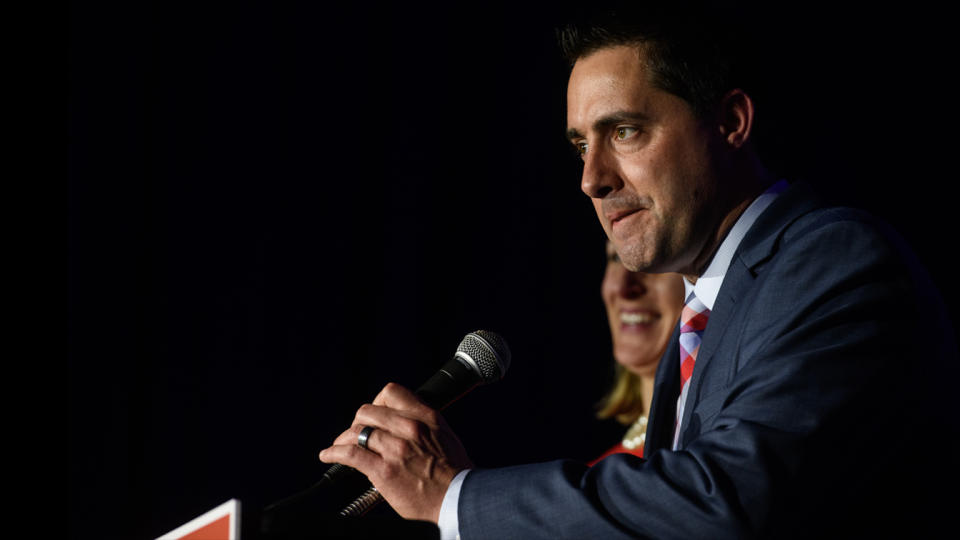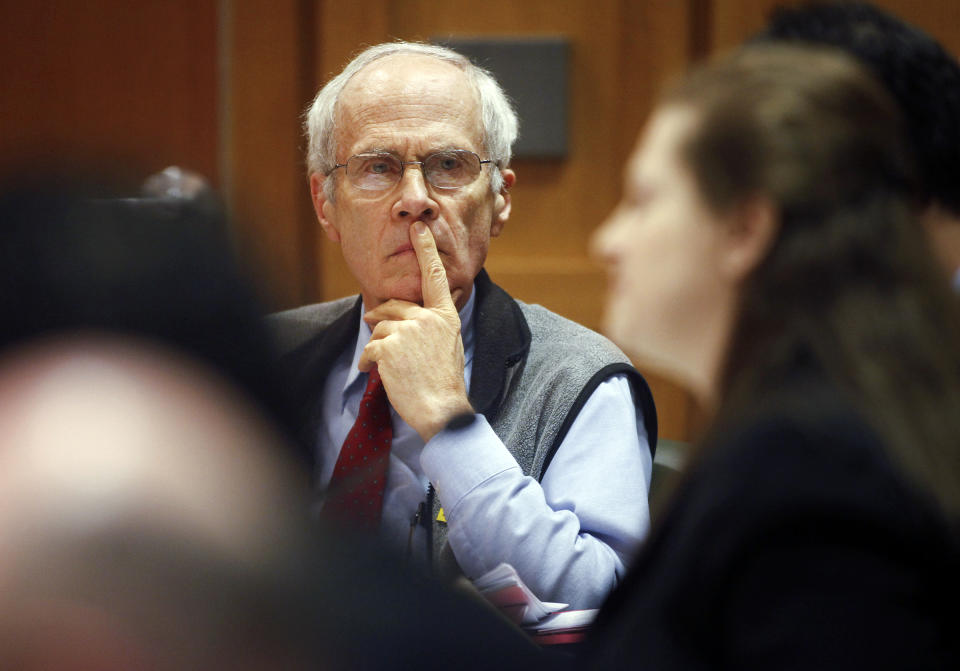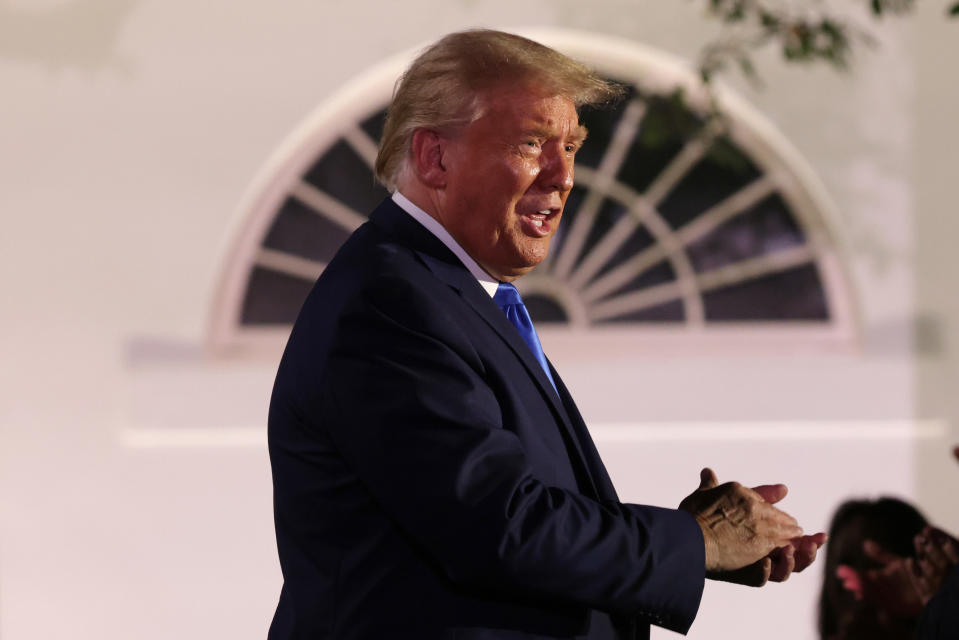GOP official warns that a single law is going to delay election results in Midwest swing states
The top Republican election official in Ohio on Thursday said that other Midwestern states where the presidential election was decided four years ago are in a “really terrible situation” because they have so far not allowed mail-in ballots to be processed in an expedited way.
Ohio Secretary of State Frank LaRose, a Republican, said that in his state mail-in ballots will be among the first ballots counted on the night of the election. This is because Ohio law allows election clerks to process mail-in ballots as they arrive in the weeks and days before the election, so they’re ready to be counted and tabulated the moment polls close.
“We can start processing those right away, meaning: Cut the envelope, open, verify the information on it, put it through the scanner, but not hit ‘tabulate.’ That can’t happen until 7:30 on election night,” LaRose said in an interview on “The Long Game,” a Yahoo News podcast.
But LaRose noted that other Rust Belt swing states don’t have laws on the books that allow mail-in ballots to be processed in advance. “Now our friends up the road in Michigan, they can't start processing ballots until Election Day,” he said.

It’s not just Michigan, however. Wisconsin and Pennsylvania also can’t process the ballots in advance, meaning a delay in results is all but certain in these crucial battleground states.
Although he decisively lost the popular vote in 2016, President Trump’s narrow victories in Michigan, Wisconsin and Pennsylvania were enough for him to win in the Electoral College. In Michigan, for example, Trump won by roughly 10,000 votes, or about 0.2 percent of all votes cast.
“If you think about a big county like Wayne County – where Detroit is – I mean, they're going to have pallets and pallets of ballots waiting to get processed, that they really can't touch until election day. And that's unfortunate,” LaRose said. He added that it “could be days” before all mail ballots are counted.
Election experts have warned for months of a nightmare scenario where — because of these restrictive mail ballot rules in Michigan, Wisconsin and Pennsylvania — Trump may have a lead in votes on Election Night if most Republican voters cast ballots in person while most Democratic voters cast ballots by mail.
If that happens — and polling suggests it might — Trump could claim victory before mail ballots have been fully counted, and then accuse election officials of stealing the election if mail ballots give Joe Biden a lead.
Trump has already claimed over and over this year, without evidence, that there will be cheating and fraud in the election, especially through mail-in voting. In response, some Democrats have also insinuated that the election results may not be trustworthy: During her speech to the Democratic National Convention last week, Hillary Clinton warned that Trump may try to “sneak or steal his way” to reelection.
But even if neither candidate claims victory on the night of the election, a lengthy delay in reporting results could lead to all sorts of unforeseen problems in a country already on edge. Right- and left-wing activists have been battling in some cities for months amid high unemployment and a coronavirus outbreak that’s left some 180,000 Americans dead so far.
The irony is that while LaRose, a Republican, criticized the system in Michigan, Wisconsin and Pennsylvania, the legislatures in all three states are totally controlled by his party. Republicans control the House and Senate in each of those states, as they do in Ohio as well.
And the secretaries of state in Michigan and Pennsylvania — both Democrats — are trying to get their respective legislatures to give their clerks the ability to process ballots before Election Day, to avoid or at least minimize delays in reporting the full vote total.
So far, the Republican legislatures in those states have done nothing on the issue.
Wisconsin Secretary of State Doug La Follette, a Democrat who has held that office for more than 40 years, has seen his power and oversight of elections reduced by the Republican-controlled legislature. The legislature now determines most of the rules for how elections are run in that state, according to a Wisconsin Democrat familiar with the process.
But a spokesman for the Wisconsin Elections Commission, Reid Magney, told Yahoo News that the WEC is “currently assessing that situation and will be working with clerks in coming weeks to get a better idea of the situation.” He added in a follow-up email that “the date on which clerks can start processing absentee ballots is codified in state statutes, which only the legislature can change.”
Wisconsin’s House majority leader, Jim Steineke, said in a tweet that his chamber had passed a bill in February that would have allowed clerks to immediately process absentee ballots that were voted in person, but the state Senate did not pass the legislation, so it did not become law. That still would not have done anything to help expedite the counting of absentee ballots that arrived through the mail. There were 1.4 million absentee votes in the state’s spring primary, and roughly 2 million mail ballots are expected in the Nov. 3 presidential election.

LaRose, a 41-year old decorated combat veteran who served in the U.S. Special Forces, pushed to expand mail-in voting during the primary elections earlier this year.
But he is now in a conflict with Democrats over drop boxes, which have emerged as a desirable alternative for voters who don’t want to vote in person because of COVID-19 but who are worried that the Postal Service might mishandle their mail ballot.
Drop boxes are secure receptacles overseen by bipartisan election officials, giving people a way to vote early with a mail-in ballot but bypassing the Postal Service.
Yet LaRose has said that counties cannot have more than one drop box each. He claims that the law doesn’t give him authority to add more, and that he wants to avoid litigation like the lawsuit in Pennsylvania, where the Trump campaign is suing to prevent the state from using drop boxes at all.
The Trump lawsuit against Pennsylvania claims that drop boxes “provide fraudsters an easy opportunity to engage in ballot harvesting, manipulate or destroy ballots, manufacture duplicitous votes, and sow chaos.”

But LaRose said he is “completely supportive” of drop boxes. He spoke at length about the measures that prevent tampering with ballots. “Once the voter casts their ballot and from then on, it is under bipartisan chain of custody,” he said.
LaRose has said that mail service in Ohio has slowed from an average of one to three days to seven to nine days, but he nonetheless maintained that “plan A for voters should be to return your absentee ballot by mail.”
The Ohio Democratic Party has sued LaRose, asking the courts to settle the issue and claiming that “nothing in Ohio law limits the number or locations for secure drop boxes that boards of elections may choose to make available to the voters in their counties.”
This article has been updated to include a response from the Wisconsin Elections Commission clarifying that state’s absentee ballot rules.
_____
Read more from Yahoo News:
You don't need the U.S. Postal Service to deliver your mail-in ballot
'I trusted them.' Some 'Build the Wall' donors feel cheated by Bannon. Some don't care.
Exclusive: DHS warns of fake election websites potentially tied to criminals, foreign actors
Oleandrin, touted as COVID-19 cure, has no scientific support



